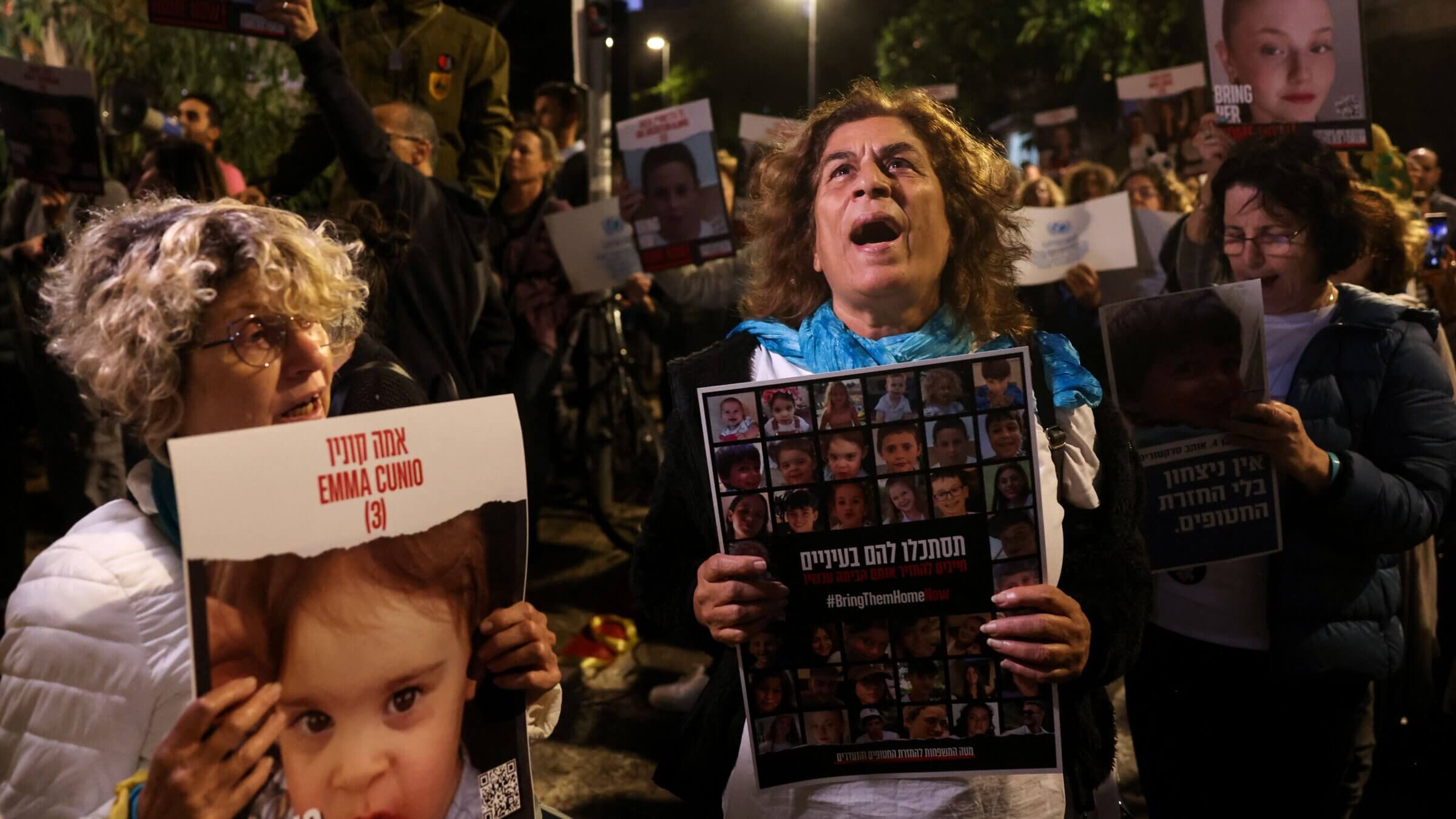The hostages in Gaza need our empathy, not our hot takes
There are enough politicians, policymakers and experts crafting sophisticated arguments for Israel’s next moves. For the rest of us, empathy demands more of our attention

A woman holds a portrait of hostage Emma Cunio, 3 years old, as protesters lift placards during a rally outside the UNICEF offices in Tel Aviv on Nov. 20 Photo by Ahmad Gharabli/AFP via Getty Images
TEL AVIV — On the promenade, I spotted an area filled with sculptures and art pieces reflecting the endless horrors of the “Black Sabbath.”
Even though I was on a date, I felt obligated to visit the tribute, and we briefly took in the exhibits: Hooded baby figures, ashen piles with a protruding child’s arm and blood-stained baby cribs were among the works on display. After minutes, we headed toward the exit. And that’s where we saw Shani Gabay’s family.
A handful of family members were organized in a semicircle, aside a bright red banner reading “MISSING.”
“Shani Gabay, still missing. 10/7,” was written in Hebrew below. A few people approached them — some for a brief conversation, others offering tea or coffee.
My date and I warily approached Shani’s father — who sat on the outer perimeter closest to us — the same way we would a mourner in a shiva home: Quietly, unassumingly, and feeling a little bit guilty.
His daughter is missing, I thought. She could be dead.
Israel is set to approve a hostage deal that would lead to the release of approximately 50 hostages over the next four days. When the news broke, two conversations emerged. One concerns pragmatics: The terms, conditions and strategy of Israel’s hostage negotiations. The other concerns emotion: The love, hope and care of Israel’s hostages.
I understand the impulse toward the first. With Hamas, Hezbollah and Iran seeking annihilation of the Jewish state, and a callously hostile international community, Israel does not have the privilege of missteps.
But there are enough politicians, policymakers and experts crafting sophisticated arguments for Israel’s next moves. For the rest of us, the second conversation demands more of our attention.
Some semblance of control
I noticed two young girls, presumably Shani’s sisters, silently huddled together in oversized sweaters near the sign. Will they ever see their big sister again? My mind shuddered thinking about their reality. I stood in stoic silence.
“Is she your daughter?” my date asked in a hurried whisper.
“Yes,” Shani’s father answered.
She hesitated: “We’re praying for her return.” His affirming nod and thank you ended the conversation, and we went on our way.
For those brief moments, we stepped into their world — one of painful, gripping terror, haunted by the unknown fate of their loved one. But when we left, we left that reality.
They do not have such a luxury, I realized. And neither do the other hostages’ families.
Perhaps, if a deal is approved, Shani’s family can celebrate her 26th birthday together in safety. Her sisters can laugh alongside her once more. Other families may, with God’s help, receive the same fortune.
I passed by crowds of protesters outside a government building later that night. They waved picket signs, distributed hostage flyers and chanted, “bring them home now.”
It felt strange to see this in Israel. Who exactly are they protesting? I wondered. We all want the hostages returned home — we are not the ones in need of convincing.
In times of crisis, many of us grasp for some semblance of control. We all become policymakers. We dictate our plans for how Israel can defeat Hamas and rescue the hostages to anyone who will listen. And still, the reality remains: The hostages are not home, and their families sit frozen on Oct. 7.
Right now, the families of the hostages do not need our heads — they need our hearts.
Babies, children, brothers, sisters, parents and grandparents were kidnapped. They lie in the clutches of the bloodthirsty terrorists who slaughtered 1,200 of us. How Israel will successfully orchestrate this impossible scenario is not for us to figure out. Right now, we need to enter the world of these families, to scream and cry and shout until every breathing soul is returned home.
“We seem like we live in the same place,” Rachel Goldberg-Polin, whose son Hersh is captive in Gaza, said at the United Nations near the end of October. “But I, like all the loved ones of the stolen, we all actually live on a different planet.”
With this hostage deal underway, I am releasing myself — and hopefully, you as well — from the self-appointed role of prime minister and hostage negotiator. Those with loved ones in Gaza are carrying unimaginable pain, and right now they need us to carry it with them.
To contact the author, email [email protected].






















